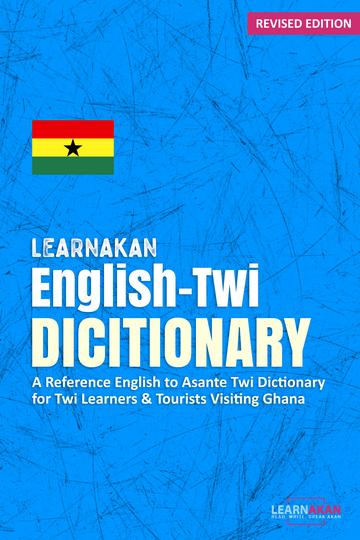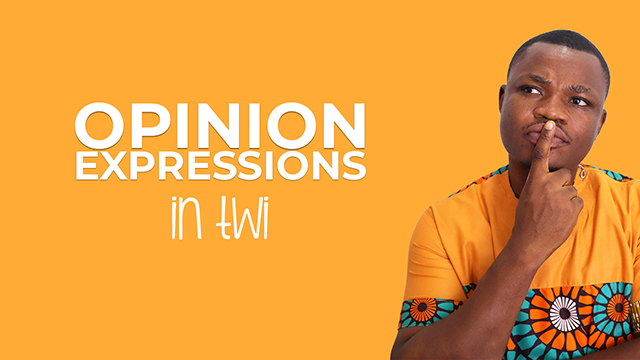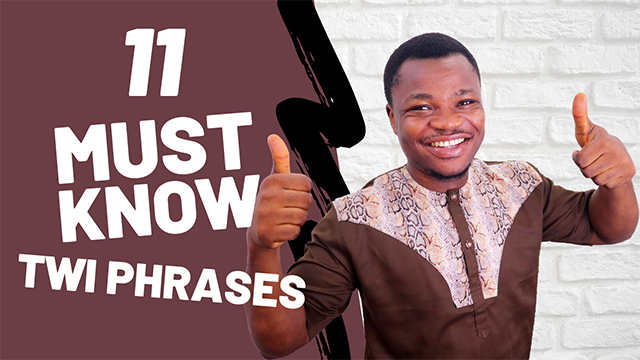UPDATE: We have a new YouTube channel. Please CLICK HERE to visit and subscribe to it for video lessons.
How do you say GOOD MORNING in Twi? How do you say GOODNIGHT in Twi? And how do you say HAPPY BIRTHDAY in Twi?
Hi there! You are welcome to third lesson in the Common Twi Expressions series. In this lesson, we look at how to greet and be polite with the Twi dialect of the Akan language.
The Akan people attach great importance to greetings and you are considered impolite if you are someone who tends not to greet people. This lesson, therefore, is very important if you plan not only to learn to speak the language but also want to blend in well with the Akans.
Continue reading beneath the embedded video.
Video Lesson
LV = Long Version
SV = Short Version
| English | Twi | Response (Twi) |
|---|---|---|
| good morning | LV: mema wo akye
SV: maakye | yaa agya (to an elderly man) yaa ɛna (to an elderly woman) yaa anua (to a sibling, age mate or colleague) |
| good afternoon | LV: mema wo aha
SV: maaha | yaa agya (to an elderly man) yaa ɛna (to an elderly woman) yaa anua (to a sibling, age mate or colleague) |
| good evening | LV: mema wo adwo
SV: maadwo | yaa agya (to an elderly man) yaa ɛna (to an elderly woman) yaa anua (to a sibling, age mate or colleague) |
| welcome | akwaaba! | yaa agya (to an elderly man) yaa ɛna (to an elderly woman) yaa anua (to a sibling, age mate or colleague) |
| please | LV: mepa wo kyɛw SV: mepaa kyɛw | |
| merry Christmas | afenhyia pa! | afe nkɔ mmɛto yɛn |
| to someone who is working/engaged in a physical activity | LV: mema wo adwuma
SV: adwuma dwuma! | adwuma yɛ |
| take care | hwɛ wo ho so yie | wo nso saa ara (you too) |
| what’s up? | ɛdeɛn na ɛrekɔ so? | ɛnyɛ biribi titire biara o! (nothing much/nothing in particular) |
| greet your family (members) for me | kyea w’abusuafoɔ ma me | wɔbɛte (they’ll hear) |
| to the bereaved | LV: mema wo due
SV: due! | usually goes with no response but you can also thank the person with (meda wo ase/medaase) |
| to a woman who just gave birth or someone who has survived an accident | LV: mema wo afirimu/mema wo tiri nkwa
SV: afirimu oo!/wo tiri nkwa oo! | LV: meda wo ase (thank you) SV: medaase |
| how are you? | LV: wo ho te sɛn?
SV: ɛte sɛn? | LV: me ho yɛ (I am well/fine) SV: ɛyɛ (it’s well) |
| happy birthday | mema wo awoda pa | LV: meda wo ase (thank you) SV: medaase |
| goodbye/farewell | nante yie |
Thank you for reading. Please support us by subscribing to the website, our YouTube channel, as well as our Facebook page.








Responses
[…] How are you? – : Wo ho te sɛn? and Please – Mepa wo kyɛw. You can also visit https://learnakan.com/akan-twi-greetings/ to learn […]
wo ho te s3n Yaw?
Awurade adom o, me ho yɛ. Wo ho yɛ?
Thanks for this important lesson. From malawi but driven closer to Ghana now. Most of times it’s difficult to interact with others simply because we can’t communicate in their local languages. It’s therefore very crucial that one learn at least the basics of other languages. Thanks ones again
Thank you too for being here.
Hi Teacher my name is Teresa from South Africa and my boyfriend is from Ghana and we always speak English but I want to learn how to speak fante(Ghanaian) language so that one day when I visit him in Ghana I would know how to speak with his people……….I really wish you could help me
How can I order my lesson 1 video
This desighn is steller! You certainly know how to keep a reader entertained.
Between your wit and your videos, I was almost moved to
start my own blog (well, almost…HaHa!) Fantastic
job. I really enjoyed what you had to say, and more than that,
how youu presented it. Too cool!
Almost? Why not? 🙂 I appreciate your words. Thank you very much
Would be so kind and advice me where to find more informations about Twi? I’d love to learn it and I’m taking it very seriously, but I’m not sure where to start.
Many thanks,
Karolina
Hi Karolina, thank you too for being here. Please check this post: https://learnakan.com/top-websites-to-learn-twi/
Hi Teacher,my name is Nicole a Nigerian but married to a Ghanaian, I really have to learn this language but it’s not been easy because we stay in Germany which the Deutsch language isn’t easy to learn too but I like your lessons and I don’t know if I can get the video on WhatsApp. If yes my WhatsApp number is ##############
Hi Nicole, thanks for your comment. As requested, I’ve sent to you the video of lesson 1. I took the liberty to slightly edit your comment for privacy.
Mema wo akye Yaw! I’ve several Ghanaian friends here in the states. One of my friends, who I met here and used to work with, has since retired in Ghana and I hope to visit him one day soon. I wanted to become acquainted with some basic Twi so I can converse a little when I get there. I’m really enjoying your lessons and appreciate the transcripts for each one. Meda wo ase!
Hi Melanie, that’s a step in the right direction. Ghanaians, including your friends, will love you if you even attempt speaking their language. I wish you all the best and happy to be of help 🙂
maakye
i have a request
whole sentenses and words
for whole sentences i will never understand it all
i need to know the language word by word,
thank you
Yaa Onua Petra
Never say never! You’ll definitely get there. I do understand that grasping whole sentences at this stage will be difficult. The lessons that include phrases and sentences such as this one is meant for intermediate learners. I get requests from such learners too asking that I publish more phrasal/sentential vocabulary lessons. So I’m doing a lil’ bit of this, and a lil’ bit of that to serve you all.
Rest assured that more word by word lessons will be published in the coming weeks. Thank you 🙂
Yaw maakye oooooo!
this is off this lesson, how do you say teacher in the Akan language?
Yaa anua 🙂
‘Teacher’ in Twi is ‘Ɔkyerɛkyerɛni’.
Ɔkyerɛkyerɛni Yaw medaase!
Medaase 🙂